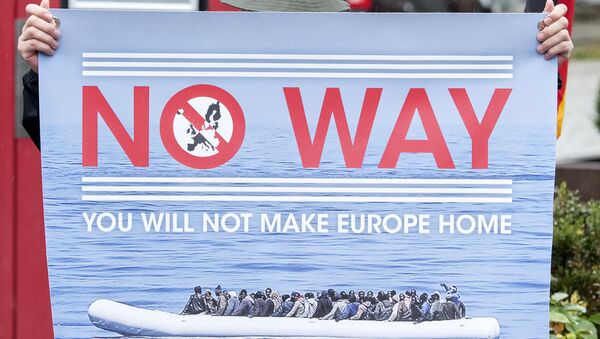Benedicte Bjørnland, head of the Norwegian Police Security Service (PST), posted on its website an announcement saying the major threat was from right-wing extremist environments, similar to those exposed by the PST Swedish counterpart Säpo.
She said the current crisis is expected to have: "adverse consequences for threats linked to the extreme-right scene. This is because opposition to immigration is one of the most important issues and an important mobilizing factor for the groups.
The notion of people fleeing extremism/ISIS — becoming an extremist? i.e. Syrian and Iraqi refugees. Does this even make sense?
— Nabeela Zahir (@NabeelaZahir) September 23, 2015
"There is also a potential for far-left extremist groups in Norway can muster around issues related to the refugee crisis. An escalation of the conflict with the extreme right could lead to counter-reactions and violent clashes between right and left-wing extremists," she said.
She denied reports of evidence of ISIL infiltrating the refugees to carry out terror plots, saying the threat was more likely to be internal.
"It is considered unlikely that the Norwegian asylum system is being used by groups like ISIL and al-Qaeda for asylum seekers arriving with violent intentions."
'Surge of the Extreme Right'
Her comments come a day after European Commission Vice President Frans Timmermans said that unless the migrant crisis in Europe was addressed properly there would be a surge of right-wing extremism across the continent.
— Frans Timmermans (@TimmermansEU) September 18, 2015
We could do so much better with a more integrated form of cooperation on border protection https://t.co/eo4Wt92yzC
— Frans Timmermans (@TimmermansEU) September 18, 2015
Timmermans also said that there needed to be better protection of the European Union's borders to deal with the hundreds of thousands of migrants fleeing war and poverty in the Middle East, Asia and Africa.
"We have to make sure that those countries where people arrive are better placed to make sure people are registered, that people who don't have the right to asylum are returned swiftly," he told BBC radio.
"If we're not able to tackle this issue, if we're not able to find sustainable solutions, you will see a surge of the extreme right across the European continent."
There has been a rise in the number of arson attacks on asylum hostels in Germany, many of them perpetrated by right-wing extremists. Officials are concerned that neo-Nazi networks may be spreading across the country.

In another country that has been welcoming to refugees, Sweden, anti-racist foundation Expo says the number of neo-Nazi propaganda actions has reached record heights. "It's an enormous increase. Just in a couple of years, in three years' time, it has almost doubled. We have never seen this many activities before," Expo investigator Anna-Sofia Quensel told Swedish Radio.



